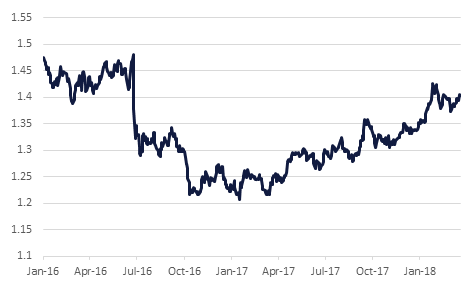
The UK reached a deal with the EU on a Brexit transition period lasting from when the UK officially leaves the EU in spring 2019 until the end of 2020, allowing the UK to remain effectively within the EU but unable to influence its decisions. The Irish border issue, which was thought likely to be a sticking point, in the end was not resolved so keeping alive the possible backstop option of Northern Ireland maintaining full regulatory alignment to the EU Customs Union and Single Market post-Brexit, unless an alternative solution can be found.
Effectively therefore, the UK government and the EU are pushing the timeframe for settling this issue out into the future, preventing it from getting in the way of other steps forward, principally over trade and migration. The hope will be that a creative solution to this issue can be found further ahead, but it also raises the stakes over what will happen if it is not. The pound rallied 1.0% on the news, but sterling now faces inflation data today which is expected to fall to 2.8% in February from 3.0% in January which may cloud perceptions about the speed of monetary policy normalization in the UK. The Bank of England meets to set interest rates this week and while a rate hike is not expected at Thursday’s meeting, the inflation news could influence expectations about whether a May tightening looks likely.
The Federal Reserve FOMC meeting kicks off today and will conclude tomorrow, while in Buenos Aries G20 finance ministers and central bankers are meeting in Buenos Aires ahead of the IMF/World Bank meetings in Washington in April. This G20 meeting takes place against fears of a global trade war, given the tariffs announced by the U.S. on steel and aluminum imports. Further tariffs worth around USD60bn are also likely to be announced this week on China over allegations of intellectual property theft, which are likely to keep the mood subdued even as the global economy is expected to strengthen further in 2018.

US treasuries closed marginally lower on the back of strength in European bonds following reports that the UK and the European Union have reached an agreement on a transitional deal. Yields on the 2y UST, 5y UST and 10y UST closed at 2.30% (+1 bps), 2.65% (+1 bps) and 2.85% (+1 bps). While yield on 10y bunds remained flat, yield on 10y Gilts rose +2bps to 1.44%.
Regional bonds remained largely unchanged with yield on the Bloomberg Barclays GCC Credit and High Yield index closing at 4.21% and credit spreads remaining flat at 160 bps.
Following the rating downgrade of the Oman sovereign, Moody’s downgraded the long-term rating of five Omani banks including Bank Muscat, HSBC Bank Oman, Bank Sohar, Bank Nizwa and Oman Arab Bank. The rating agency maintained a negative outlook on these five banks. The rating of Bank Dhofar and National Bank of Oman was affirmed at Baa3 with negative outlook.
GBPUSD rallied by 0.59% on Monday, following news of the agreement over a Brexit transition deal between the UK and the EU. The price reached 1-month highs of 1.4088 before slipping back to its present level of 1.4036. This move has taken GBPUSD well above the 50 day moving average (1.3935) which has acted as a support level since 13 March 2018 and is a bullish sign for cable. In addition, the 14-day RSI shows bullish momentum and currently is at 60.00 indicating that further bid for sterling is likely in the short term. This afternoon, investors will be eying inflation data which is expected to show that headline consumer prices rose by 2.8% y/y in February. Any upside surprises in the data is likely to result in further bids for GBP.
The DXY gave back most of the gains it made late last week, bottoming at 89.80 and closing under both its 20- and 50-day moving averages. Indeed the 50 day moving average which gave the index support on Friday failed to halt declines on Monday and even acted as a source of resistance in the Asia session. Should the index close below this level for an additional day, it has short-term bearish implications for the index.
Global equity markets closed lower led by technology stocks. Reports of a possible data breach at Facebook and Apple looking to manufacture its own screens weighed on the sector. This coupled with the Federal Reserve meeting starting later today and ongoing political manoeuvring in the US turned investors cautious. The S&P 500 index and the Euro Stoxx 600 index dropped -1.4% and
-1.1% respectively.
Most regional markets closed lower with the DFM losing -0.3% and the Tadawul -0.2%. There was nothing specific in terms of individual stock movements.
Oil markets got off to a relatively quiet start to the week with both benchmark futures contracts edging lower. Oil and commodities generally were caught up in the slump in equity markets overnight but both WTI and Brent are up slightly this morning. There has been little fundamental developments to push markets in any direction although Azerbaijan is considering joining OPEC according to press reports.